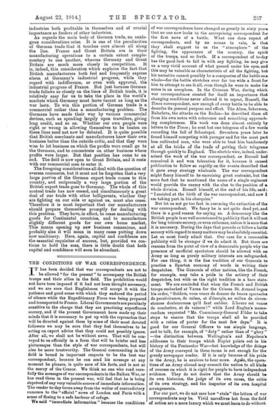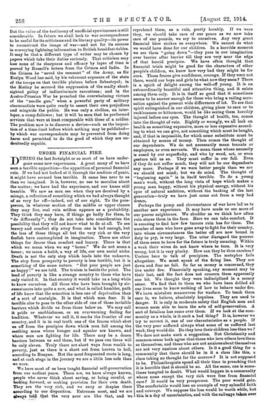THE CONDITIONS OF WAR CORRESPONDENCE.
IT has been decided that war correspondents are not to be allowed "for the present" to accompany the British troops and their allies in the field. The prohibition would not have been imposed if it had not been thought necessary, and we are sure that Englishmen will accept it with the patience and good sense with which they endured the period of silence while the Expeditionary Force was being prepared and transported to France. Liberal Governments are peculiarly sensitive to the charge that they are practising superfluous secrecy, and if the present Government have made up their minds that it is necessary to put up with the reproaches that will be directed against them by some of their most devoted followers we may be sure that they feel themselves to be acting on expert advice that they could not possibly ignore. After all, we shall not be without news. That will be con- veyed to us officially in a form that will be briefer and less picturesque than the style of war correspondents, but will also be more trustworthy. The General commanding in the field is bound in important respects to be the best war correspondent, because he can send his message at any
moment he pleases, is quite sure of his facts, and is not at the mercy of the Censor. We think no one who read care- fully the messages of war correspondents in the Balkan War, or has read them in the present war, will feel that he is being deprived of any very valuable source of immediate information.
The reader to-day turns away from the welter of contradictory rumours to the " official " news of London and Paris with a sense of fleeing to a safe harbour of refuge.
We said "immediate information " because the conditions of war correspondence have changed so greatly in sixty years that no one now looks to the enterprising correspondent for the first news of a battle. What one does expect of correspondents, and by no means in vain, is that they shall suggest to us the " atmosphere " of the fighting, the appearance of the country, the spirit of the troops, and so forth. If a correspondent of to-day has the good luck to fall in with any fighting, be may give us a very vivid account of what passed under his eyes, and this may be valuable as characteristic of all the fighting, but his narrative cannot possibly he a conspectus of the battle as a whole—for the battle stretches over far too wide a front for him to attempt to see it all, even though he were to make his notes in an aeroplane. In the Crimean War, during which war correspondence created for itself an importance that changing conditions never allowed it to repeat, Russell, the Times correspondent, saw enough of every battle to be able to describe its general purpose and effect. The Alma, Inkerman, Balaclava, the attacks on the Redan—he described them all from his own notes with coherence and something approach- ing completeness. His work was done almost entirely by letters to the Times; he sent but one telegram of a few words recording the fall of Sebastopol. Seventeen years later he found himself competing with younger and for the most part less cultivated men, who were able to beat him handsomely at all the tricks of the trade of getting their telegrams through quickly to England. The electric wire, indeed, under- mined the work of the war correspondent, as Russell had conceived it and won toleration for it, because it caused publication to follow so rapidly on the events described that it gave away strategy wholesale. The war correspondent might fancy himself to be exercising great restraint, but the mere fact that be mentioned the name of a single regiment would provide the enemy with the clue to the position of a whole division. Russell himself, at the end of his life, said: " I assisted at the birth of the war correspondent, and now I am taking part in his obsequies."
But let us not go too fast in assuming the extinction of the war correspondent. We fancy he is not quite dead yet, and there is a good reason for saying so. A democracy like the British people is so well accustomed to publicity that it will not for long tolerate secrecy, or even reticence, unless it is sure that it is necessary. During the days that precede or follow a battle secrecy with regard to many matters may he absolutely essentiaL Let us most freely admit that. Our case for a reasonable publicity will be stronger if we do admit it. But there are reasons from the point of view of a democratic people why the presence of unofficial spectators should be allowed with an Army so long as purely military interests are safeguarded. For one thing, it is the fine tradition of our Generals to practise a Spartan economy of words in writing their despatches. The Generals of other nations, like the French, for example, may take a pride in the artistry of their despatches, but with• us the right tradition is a bare state- ment. We are reminded that when the French and British troops embarked at Varna for the Crimea St. Arnaud began his order, " Soldats, vous venez de donner de beaux spectacles de perseverance, de calme, et d'energie, an milieu de circon- stances douleureuses qu'il fent oublier. L'heure est venue de combattre, et de vaincre !" while Lord Raglan's memo- randum requested "Mr. Commissary-General Filder to take steps to ensure that the troops shall all be provided with a ration of porter for the next few days." It is good for our General Officers to use simple language, and to talk, for example, of " duty " rather than of " glory " —the distinction between Wellington's and Napoleon's addresses to their troops which Napier points out in his history of the Peninsular War—but knowledge of the doings of the Army conveyed in these terms is not enough for the greedy newspaper reader. If it is only because of his pride in the Army, he is anxious to hear more. Again, the opera- tions of an Army abroad may commit the nation to all kinds of courses on which it is right for people to have independent evidence. They do not desire that the Army should be its own historian, the judge of its own cause, the critic) of its own strategy, and the inspector of its own hospital arrangements.
For our part, we do not care how " stale" the letters of war correspondent. may be. Vivid narratives hot from the field of action are a mere luxury which we must learn to do without. But the value of the testimony of unofficial eyewitnesses is still considerable. In future we shall look to war correspondence to be useful for its criticisms and its literary quality—its power to reconstruct the image of war—and not for its success in conveying lightning information to British breakfast-tables. It may be that a different type of writer may be chosen by papers which take their duties seriously. That criticism may lose none of its sharpness and efficacy by lapse of time is proved by Russell's letters from the Crimea and India. In the Crimea he " saved the remnant " of the Army, as Sir Evelyn Wood has said, by his vehement exposure of the state of the troops on that terrible plateau before Sebastopol; in the Mutiny he secured the suppression of the madly short- sighted policy of indiscriminate executions ; and in the Austro-Prussian War he preached the overwhelming virtues of the "needle gun," when a powerful party of military obscurantists were quite ready to assert their own prejudices and misguide the public. He was only a civilian, an inter- loper, a camp-follower; but it will be seen that he performed services that were at least comparable with those of a soldier. The problem now is to discover a device—such as the imposi- tion of a time-limit before which nothing may be published— by which war correspondents may be prevented from doing harm and permitted to do the good of which they are un- doubtedly capable.



































 Previous page
Previous page